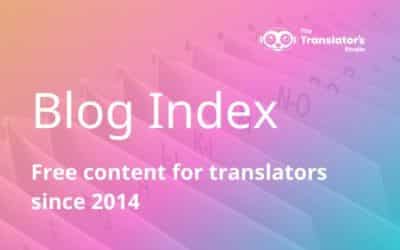For companies expanding into foreign markets, marketing translations are an important tool. But translating your marketing materials needs as much care and attention as you put into creating the originals. Read on for eight ways to make sure you get the very best marketing translations.
1. Do I need a professional translator?
Did your friends and family write your original marketing materials? No? You used a professional, right? Deciding who to get to translate them is no different. You need a professional. Google Translate and other free options might seem tempting when you have so many other costs to consider. But they’re false economy in the long run.
Not convinced? Check out my article “Why not Using Professional Translators is False Economy”. Working with a professional will mean you get marketing translations that do what they’re supposed to: help you promote your brand or product. Don’t waste your money elsewhere.
2. Should I choose an accredited translator?
How do you find a professional translator for your marketing translations? One way is to work with an accredited professional. What do we mean by accredited? Accredited translators have official recognition. This means they have officially recognised qualifications and are members of translator associations.
For instance, professional translators usually have an MA in Translation or the Chartered Institute of Linguists’ Diploma in Translation. Like Gwen and I, most professional translators are also members of professional associations such as the Chartered Institute of Linguists or Mediterranean Editors and Translators.
Working with an accredited translator means working with a professional. It means a translator who is consistent, quick, accurate and punctual. This guarantees a level of service. Accredited translators handle your documents with professionalism and confidentiality. For more information about what accredited translators can offer and why you should use one, read my article, “Why You Should Use Accredited Translation Services”.If your marketing translation includes slogans, you need someone who can do more than just translate the words.
3. Do I need a translator or a transcreator?
Depending on your project, you might need someone who can offer creative translation and copywriting. When it comes to marketing translations, sometimes what you need is something called transcreation. It’s used for materials that need a more creative approach. A blend of translation and copywriting, it might be the solution you need. For more information about transcreation, read Gwen’s blog, “What Is Transcreation? Is It Different to Marketing Translation?”.
Ask yourself these 8 questions to get the best marketing #translations #xl8 Share on XTranscreators can offer copywriting skills as well as translation. They can advise you on cultural issues and visuals as well as just the words. If your marketing translation includes slogans, you need someone who can do more than just translate the words. Gwen wrote about this in her article on LinkedIn, “A Slogan transcreation Example and How It Affects Pricing”. I explained what happens when slogans and other creative translations go wrong in “Transcreation Examples: the Good, the Bad and the Ugly”. Use a professional transcreator to make sure your text isn’t one of the ugly ducklings.
4. What do I need to tell the translator?
When it comes to more creative projects, it’s important to have clear objectives. It’s also important to communicate your objectives clearly to your translator. They aren’t mind readers. The translator needs to know about your product and how you’re marketing it. Tell them who it’s for, when you need it, and in what format. This will help them create a tailor-made quote. The translator needs a clear brief on what you hope to achieve.
5. How should I brief the translator?
A good brief is the first stage of the process for marketing translations. These types of projects often need someone who can think out of the box. But your translator needs information about the box first. Tell your translator about your product, your aims and objectives. Provide them with all the materials they need. Share your buyer persona.
The more information you can give your translator, the better the job they’ll be able to do. The translator may need to ask you questions. This isn’t a weakness. It’s a sign they’re thinking hard about your translation. Being available to answer their questions will help them produce top-quality work. For more information about creating briefs for creative projects, read “How to Get the Best Out of Your Transcreator. Mapping Out the Perfect Brief”.The more information you can give your translator, the better the job they’ll be able to do.
6. How does formatting affect price?
Don’t forget to think about formats. Most translators charge different prices for work that takes longer. This might be because the format is poor quality or not editable.
PDF files involve a lot of formatting work and extra time for translators and this is reflected in the price. If you can supply the translator with Word files, it will work out more cost effective for you. For more information about how translators charge for PDF files, read our “Translator Survival Guide to Profitable PDF Pricing”.
Need marketing #translations? Read this article for 8 ways to make sure you get the best result. #t9n Share on X7. What will my quote include?
If you work with a professional translator, they’ll give you a quote before they start work. You can help your translator give you an accurate price if you give them certain information. For marketing translations, you might have visuals as well as texts. The translator will need to see the texts and if your project is creative, they’ll need to see visuals and other related materials too.
Let the translator know about repetitions and whether this job is part of a bigger project. They may be able to offer you reductions on the price. Make sure you explain your deadline too, because if it’s very urgent the translator may have to rearrange their working day to accommodate you. This may involve surcharges. Read Gwen’s article “Translation Quote Guide for Customers” for more information.
8. How much will it cost me?
The price will depend on a range of different factors. Obviously, the bigger the project the more expensive it is. But urgent projects may involve surcharges, which increase your costs. As we mentioned before, PDF files may take longer which makes them more expensive. If there’s a lot of repetition, the translator may be able to use specialist software and pass on a discount to the customer. Upfront payment can sometimes mean the translator can offer a percentage discount.
Marketing translation often involves a greater degree of creativity. Some marketing projects need a transcreator and/or copywriter. This will change how the project is priced. Many translators use a per-word or per-line price to calculate how much the project will cost. But creative projects are often priced differently
Transcreation projects are much more time consuming and so are usually quoted with a per-hour or per-project price. The more information and background material you can give your translator, the quicker they can work. This can help keep the price down. Our “Customer Guide to Transcreation Rates” is a good overview.
Gwen and I are translators, transcreators and copywriters, specialising in marketing materials. Get in touch with us for more information about how we can help.




0 Comments